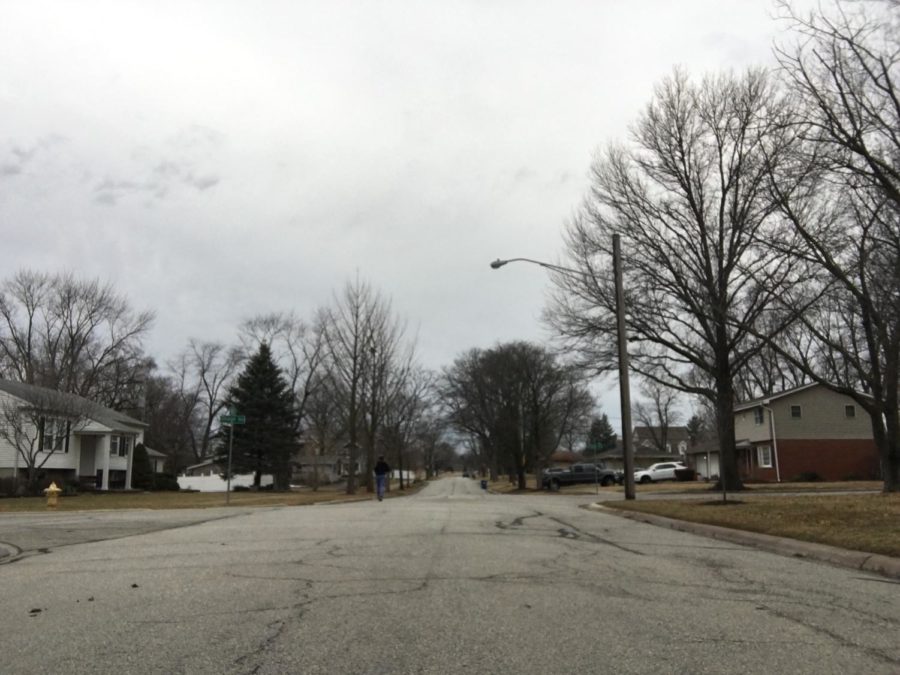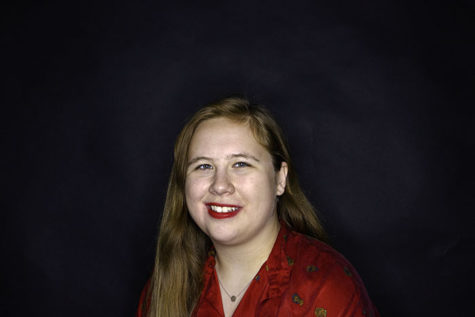The Japanese House tells the story of my broken relationships, but it actually sounds good

The suburban recreation of the cover art on “Good At Falling,” the debut album from The Japanese House.
The Japanese House released her debut album on March 1, 2019, and it’s the story of all my relationships ever. Except it’s actually my favorite album of 2019 so far and isn’t about a 17-year-old girl crying over the fact the same girl dumped her for the third time in a row. Instead, it perfectly paints the story of a relationship’s starting, middle and ending points.
Just to clarify, The Japanese House isn’t a whole band, it’s just one girl named Amber Bain who recently captured my entire heart. Bain’s three previous EPs “Pools to Bathe In”, “Swim Against the Tide” and “Saw You in a Dream” are also works of pure indie magic that only lead up to the big reveal — and oh what a big reveal it was.
First, this album did one of my favorite things and had me automatically fall in love with it — it was a storybook album. Each track was perfectly connected without a true fault between the songs, making it a perfect vinyl album or one you just can’t shuffle.
Starting with the perfect introduction in “went to meet her (intro)”, the relationship goes through happiness (“We Talk All The Time”) and the harder times that come along too (“You Seemed So Happy”, “Follow My Girl”). Eventually, the relationship ends (“Lilo”) and the stages of grief (“Everybody Hates Me”) lead us to a state of closure (f a r a w a y).
Along with an easy to follow storyline, Bain’s vocals shook me to the core. I normally hate when anyone’s voice is distorted because I feel like it ruins their tone quality.
Amber Bain changed everything.
The distortion in her voice in the opening track is absolutely haunting and made the hair on my arms stand on end. Pure vocal beauty like that shouldn’t be possible, especially with adjustments being made to her voice. Yet, I suddenly became completely entranced with the rough timbre of her voice.
With a stunning lower range and an impressive middle range as well, the Japanese House ends up boasting better vocals than her Dirty Hit counterparts No Rome, Pale Waves and dare I say it– The 1975. Her voice gets stuck in my head and it never wants to come out. Honestly, I never want her voice to leave.
Ever.
While each instrumental adds something new along with the infectious drumbeat and simple electronic noises coming in and out. The electronic sax solo in “Follow My Girl”, beautiful harp in “Marika is sleeping” and the cabaret esque piano in “Everybody Hates Me” serve to be some of the highlights musically. Bain uses the bass to her advantage in every single song, making every track a little bit danceable for the sad subject matter it processes.
Some sounds are taken right out what sounds like the rejected samples from other bands on the Dirty Hit roster. “Wild” gives off a glittery vibe with a more alternative rock approach, something like The 1975’s earlier work. While “You Seemed So Happy” and “somethingfartoogoodtofeel” sound more like Wolf Alice’s latest album “Visions of a Life”.
The best songs on this album; however, come at the very end with “f a r a w a y” and the saddest song of all time, “I saw you in a dream”. Throughout the former, the switches between major and minor took me for a whole trip. There is so much distortion and delay in the guitar that turns this track into an interstellar adventure, rather than just a good song.
“I saw you in a dream” made me cry at least twice during the first listen. It’s not just the beautiful acoustic guitar that makes me weep, it’s the lyrics that hit me somewhere deep inside my cold, shallow heart. The opening stanza though, is what truly killed me.
“I saw you in a dream/ You had stayed the same/ You were beckoning me/ Said that I had changed/ Tried to keep my eyes closed/ I want you so bad/ Then I awoke and it was so sad”.
This hurt my little, innocent 17-year-old heart. Everything I’ve felt in relationships and all the lust with the pain of heartbreak symbolized in seven lines. When a song can speak directly to your experiences, you know that it’s amazing.
Overall, this album is perfection in every degree. I can’t stop listening over and over again, it’s all I’ve played for the last week and while my friends are starting to get annoyed, I don’t think I ever will. The Japanese House has opened it’s doors and took my soul with no intention of giving it back.


